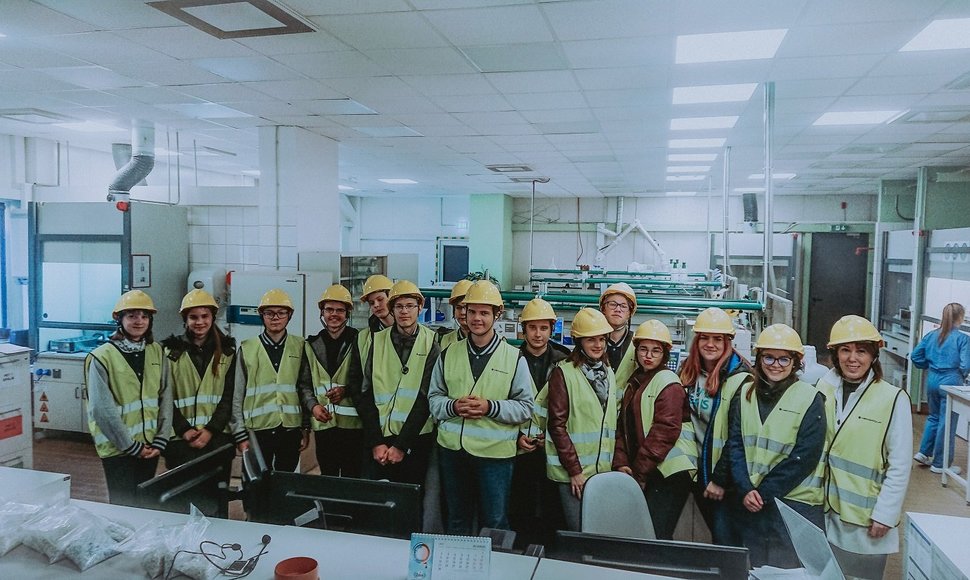According to the students, such as involvement with industrial technologies and processes not only encourages them to choose engineering studies but also to contribute in the future to creating innovative and sustainable products in their home city.
The Baltic Gymnasium High School’s experience in participating in company life has begun in 2018 and after successful pilot project visits one of the largest and most modern European PET manufacturers NEO GROUP, which operates in Klaipėda FEZ, joined the initiative to encourage engineering practices and involvement. During the nine-month-long project, twelve engineering section students were split into four teams and within the project spent several hours a month working alongside NEO GROUP specialist-mentors. They gained experience in automation, energy systems, mechanics and technology, with the school year being crowned by a final engineering project, which combined all these elements – the presentation of a continuous APP manufacturing process.
NEO GROUP CEO Ruslanas Radajevas says that gymnasium students nowadays are particularly interested in the topics of sustainability, recycling, environmental or circular economy and are pleased to learn that these issues can be solved through engineering knowledge and experience.
“Therefore, for the main part of our project, we chose to look closer into the manufacturing processes and technologies of one of our most ecological and sustainable products – APP. For the production of this material, we use around 45% of recycled plastic, returning it back to a new, meaningful and effective life in the construction industry. We are pleased not only because we showed how an engineering industry company operates, but also because we demonstrated to our young people that engineering, mechanics and technology are the fundamental tools to resolve global sustainability and environmental protection questions,” R. Radajevas comments.
According to Jurgita Račkauskienė, the director of Klaipėda‘s Baltic Gymnasium, during the project, the students and educators were pleased to have the opportunity to apply their theoretical learning in practice, linking aspects of their existing knowledge to new information.
“During this academic year, students from the Baltic Gymnasium improved their knowledge not only in science and technical courses at NEO GROUP, they also improved their communication and teamwork skills and expanded their understanding of engineering. Parents were also happy with the project – the opportunity to take a closer look at a profession and the subtleties of working in a real business environment are very valuable when considering future studies and careers,” J. Račkauskienė stated.
According to her, compared to the start of the 2018 engineering class in the gymnasium, interest in engineering studies has increased significantly after the first year. Two years ago one engineering class had 17 students, while from September 2020, already 119 gymnasium students will be studying a course which is based on an engineering education programme.
The students participating in the project claim that the opportunity to gain “hands-on” experience of the daily operations of NEO GROUP was inspiring and “eye-opening.”
“This project was an incredibly beneficial and valuable experience helping guide me towards what I could do in the future. The work of engineers is very responsible and at the same time encourages me to push myself further in this direction. Although I worked in the mechanics group where we dealt a bit less with the topic of recycling, my fellow students from the chemistry and technologies groups dedicated significant effort to sustainability, recycling and environmental protection. I believe that nowadays young people take environmental questions very seriously. It’s truly important to us,” a participant of the project, Auksė said.
She adds that previously, she did not imagine how broad and modern are the ongoing factory manufacturing and, in particular, R&D activities which she got to see almost every day. “NEO GROUP showed us their extensive laboratory and the research performed within it. It is incredible and very interesting that this is all happening in our own city,” the gymnasium student stated.
The professionals of NEO GROUP who participated in the project also see the great importance of showing their work and opportunities to young people.They included: automation engineer Simonas Baltunis, electrical engineer Ignas Krasuckas, mechanical engineer Arūnas Gelžinis, Research & Experimental Development manager Petras Žutautas and technologist Vitalijus Galican.
“By being able to talk about engineering deeper, we contribute to the students’ education. Even if they don’t eventually become engineers, we will know that we offered the students a broader understanding of the world around them. As such, we have no doubt that it is definitely worth participating in such a project and we will gladly contribute again to this initiative next year,” V. Galican stated.
UAB NEO GROUP is one of the largest polyethylene terephthalate (PET) resin producers in Europe and is located near to the Port of Klaipėda. It began operations in Lithuania in 2004 and to date, the NEO GROUP factory is the largest greenfield investment in Lithuania. Currently, the factory produces over 450 thousand tonnes annually, 14% of all European production of PET resins used in food and beverage packaging.












